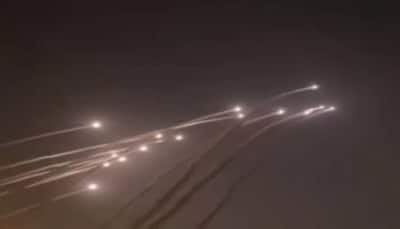New Delhi: As missiles fly between Israel and Iran for a fourth straight day, the shockwaves are just being felt in Tel Aviv and Tehran. From oil markets to airports, the ripple effects are rapidly circling the globe – raising alarms for investors, governments and travellers alike.
The military confrontation took a deadly turn after Israel carried out a wave of strikes on Iranian soil last Friday, killing over 220 people, including military officers, nuclear scientists and reportedly at least 70 women and children. The damage was not limited to lives lost. On Saturday, flames erupted at Iran’s prized South Pars gasfield, crippling a critical component of its energy infrastructure.
Iran answered back fast. Drone swarms and ballistic missiles filled Israeli skies, some piercing defenses and leaving behind destruction. At least 24 Israelis were killed in the counterattacks.
As these exchanges continue, U.S. President Donald Trump issued a warning to Iran through one of his Truth Social posts. Tehran, he said, is on notice. The “next attacks” are already mapped out, and they will be “even more brutal” if Iran does not return to the negotiating table on its nuclear programme.
But as weapons thunder across borders, the real panic is spreading far wider through shipping lanes, global markets and flight paths now scrambling to dodge a possible wider war.
Within hours of Israel’s strikes, Brent crude shot up to $74.60 per barrel, nearly 7% higher than Thursday’s level.
The reason is one-third of the planet’s seaborne oil passes through the Strait of Hormuz, the slim waterway wedged between Iran and the Gulf nations. Only 33 kilometers wide at its narrowest, it is a chokepoint through which 21 million barrels of oil are shipped daily.
The worry now? That Iran might actually go ahead and close it.
A top Iranian lawmaker, Esmail Kosari, confirmed that Tehran is actively weighing the option. That single move could spike oil prices to $100 a barrel or more, according to Goldman Sachs.
But it is a risky card to play. The last time Iran and Iraq fought a war in the 1980s, Hormuz stayed technically open even as oil tankers were attacked. And shutting it down now would also strangle Iran’s own exports to China, risking billions in revenue.
Hamzeh Al Gaaod, from TS Lombard, summed it up, “The backlash from blocking Hormuz could be devastating for Tehran itself.”
A spike in oil prices does not just pinch at the fuel pump. It inflates the cost of food, clothing, chemicals and just about everything tied to energy.
That is what has global economists sweating. If the fighting drags on, import-heavy nations could be staring down higher inflation and slower growth.
Worse still, central banks will not have much room to maneuver. “The G7 is currently cutting interest rates,” said Al Gaaod, “and this kind of energy shock limits their ability to act”.
The UK’s Bank of England recently trimmed its base rate to 4.25%, while the US Fed has held off, citing Trump’s sweeping tariffs that have already added pressure on global trade.
The initial jolt hit Wall Street. On Friday, the S&P 500 and Nasdaq Composite sank 1.1% and 1.3% respectively. In the Middle East, the tremors were stronger. Egypt’s EGX 30 plummeted 7.7%, while Israel’s own TASE 35 Index dropped 1.5%.
Europe did not escape either. Germany’s DAX, France’s CAC 40 and the UK’s FTSE 100 all posted losses late last week.
But defense stocks told a different story. UK-based BAE Systems surged nearly 3%. In the United States, military giants Lockheed Martin, Northrop Grumman and RTX all saw shares rise. So did oil companies. BP closed nearly 2% up, and Shell gained over 1%.
Gold also climbed, reaching $3,426 per ounce, inching toward April’s record high of $3,500.
By Monday, there was some calm. Investors dipped back into riskier assets, pushing gold and oil slightly lower. Stocks edged upward again. But as Al Gaaod noted, “That is only because Iran has not yet hit any US military targets.”
While oil surges and stock tickers swing, planes are being grounded across the region – Emirates has suspended flights to Iraq, Iran, Lebanon and Jordan until June 30; Etihad Airways halted all Abu Dhabi-Tel Aviv flights, and is rerouting several routes; Qatar Airways pulled the plug on services to Iran, Iraq and Syria “until further notice”.
Iran’s own authorities have closed its airspace, according to IRNA, and Iraq followed suit – shutting airports and halting air traffic altogether. That is significant. Eastern Iraq is one of the world’s busiest aviation corridors, linking Europe and Asia.
Even Jordan joined in, announcing a temporary closure of its airspace “in anticipation of regional escalation”.
Tourism, predictably, has stumbled. But Al Gaaod believes the dip will be brief. “Travel could bounce back in a month or so if the skies stay safe,” he said.
Whether this crisis remains a limited military exchange or spirals into a broader economic earthquake depends on what happens next. If the Strait of Hormuz closes, if oil prices jump past $100, or if Tehran hits a US base, markets will be rattled, they will be shaken.
So far, investors are holding their breath. But they are not blinking. Not yet.
Stay informed on all the , real-time updates, and follow all the important headlines in and on Zee News.








